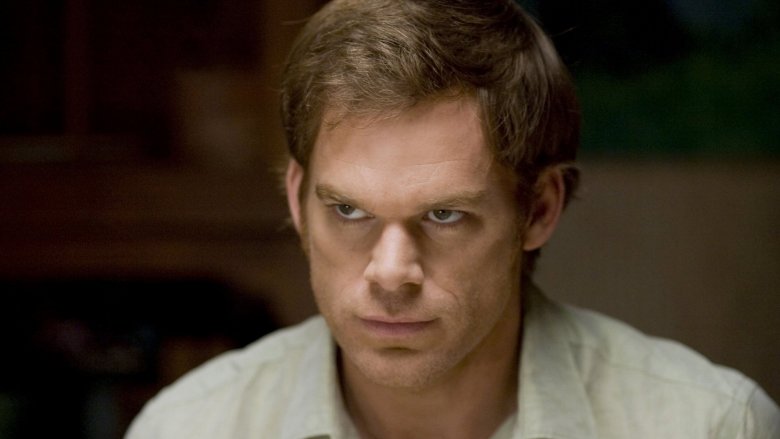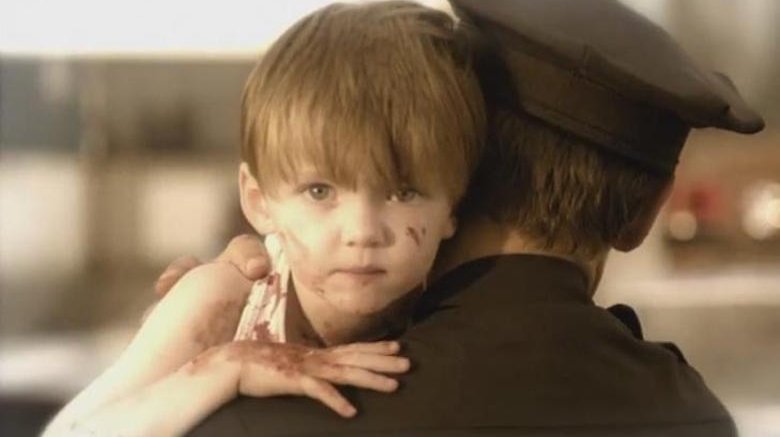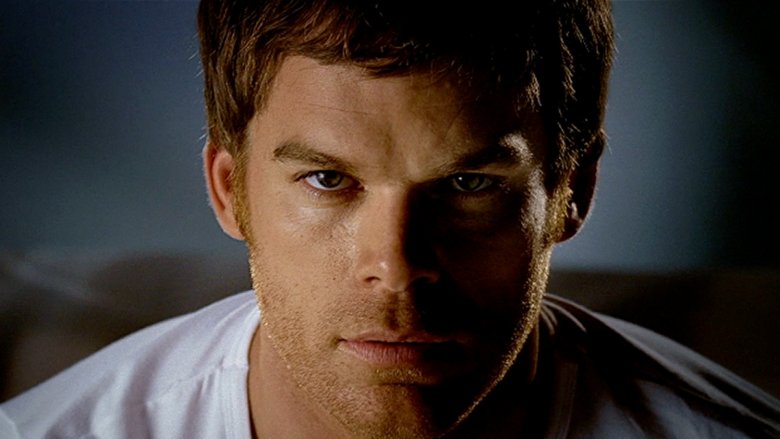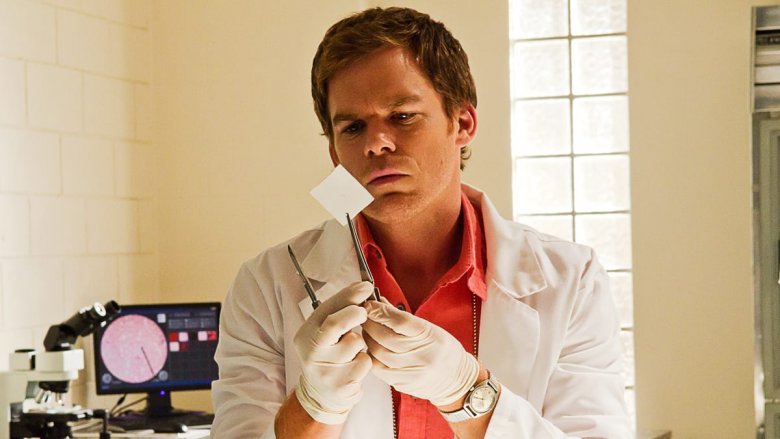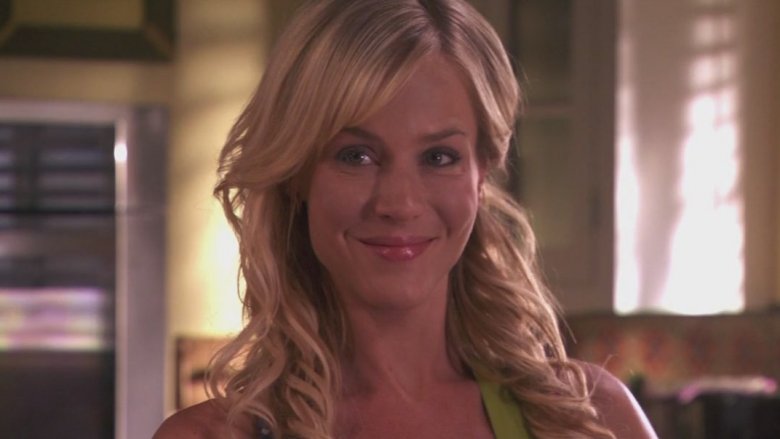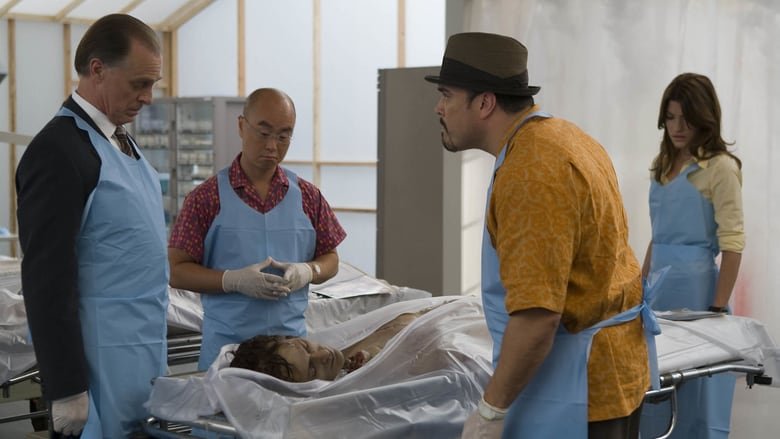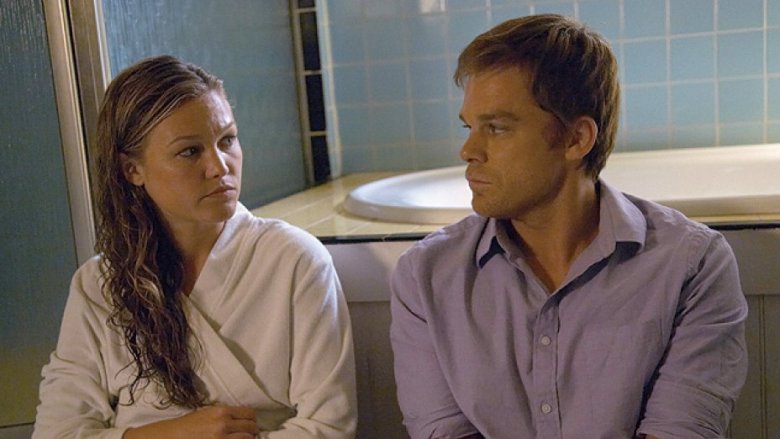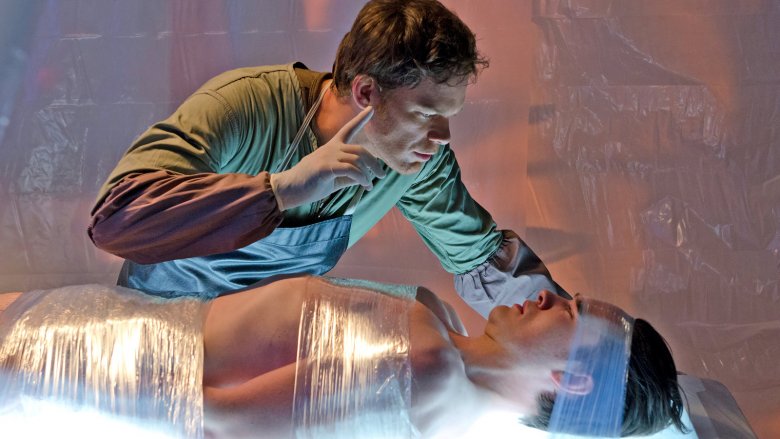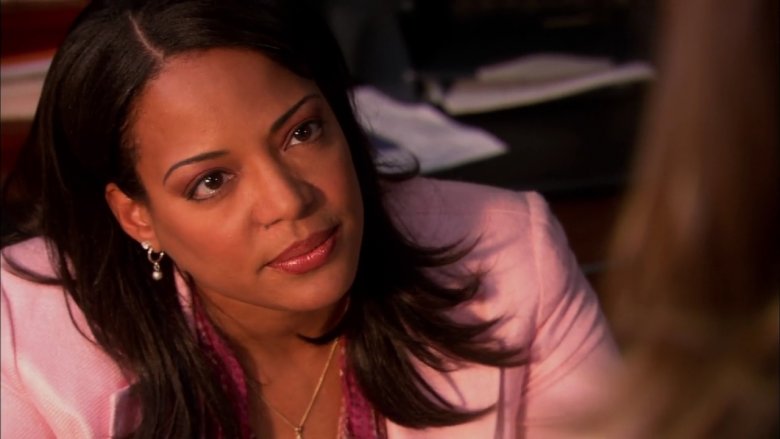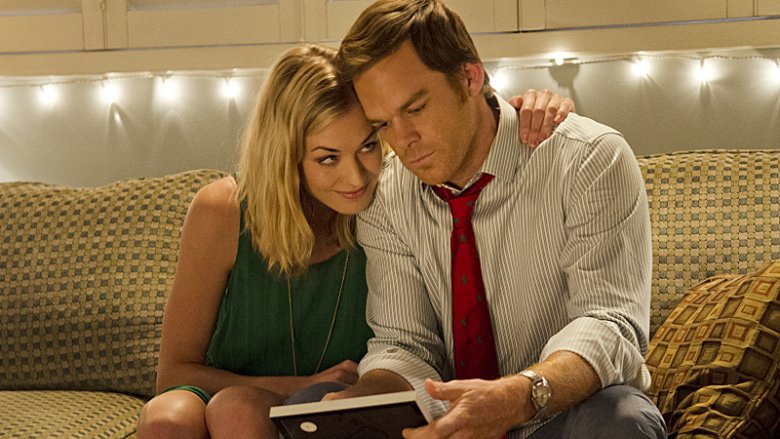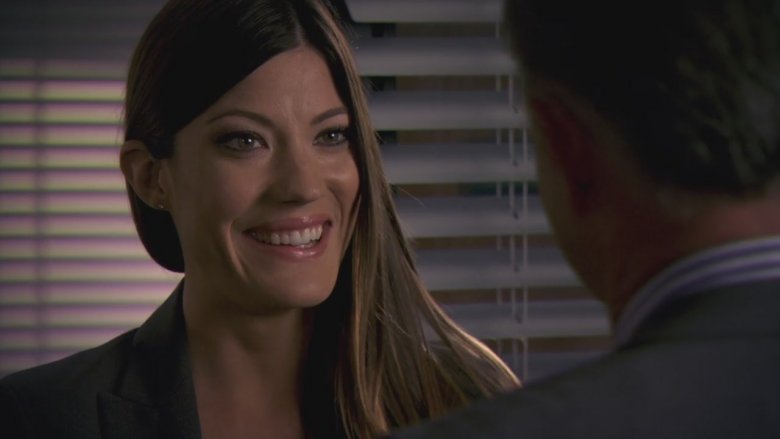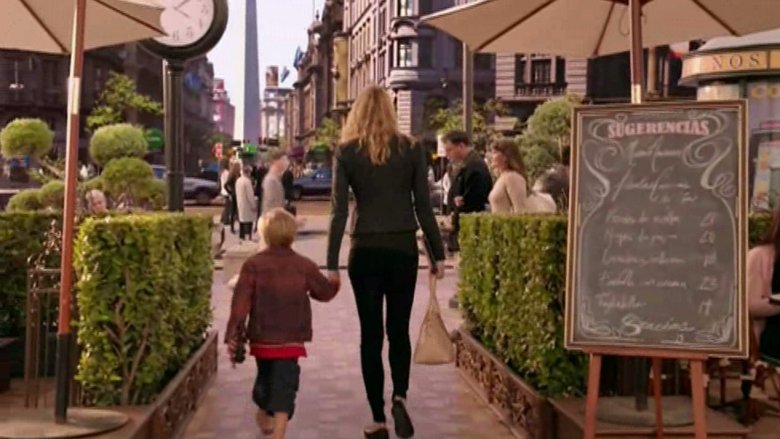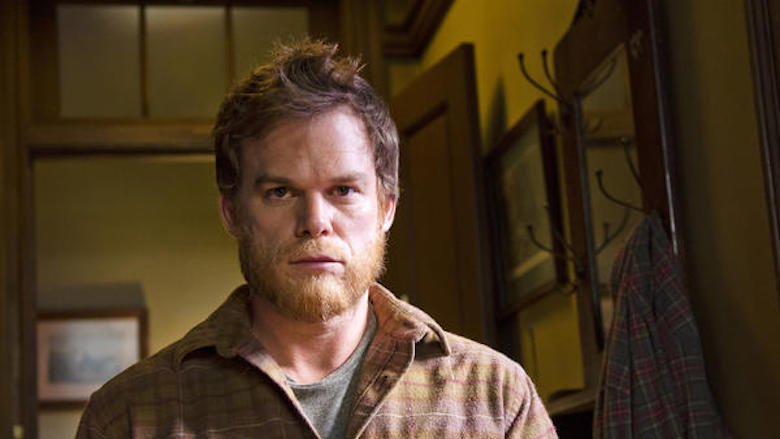We Finally Understand The Ending Of Dexter
On October 1, 2006, the world met its friendliest serial killer, Dexter Morgan (Michael C. Hall) — and fell in love with him. Dexter wasn't like other habitual murderers. By day, he was a seemingly harmless blood spatter analyst for Miami Metro Police Department who brought his colleagues donuts every morning. But by night, he transformed into a murderous vigilante, hunting down killers and other violent predators who had escaped justice before they could do their worst again.
Dexter became one of Showtime's most-watched shows of all time, consistently breaking viewership records in its early seasons. Unsurprisingly, Dexter heralded a renaissance for serial killer narratives, being quickly followed up by Hannibal, Mindhunter, True Detective, The Fall, Bates Motel, Scream Queens and a host of others on a variety of platforms. But few if any have matched the unique star power of Dexter Morgan and his singular moral code.
Tonight's the night. The room is wrapped in plastic. This time we're analyzing the ending of Dexter. Put on your gloves and mask. It's about to get messy.
Who created Dexter?
When Dexter was just two years old, his mother was brutally murdered by a cartel boss who hacked her to pieces with a chainsaw and left her children sitting in her blood. At first, the audience is encouraged to believe that this foundational trauma is what put Dexter down the path to not just being a forensic blood spatter analyst, but also a serial killer. When Dexter's father Harry Morgan (James Remar) realizes his son lacks emotional empathy and might possibly be a sociopath with psychopathic tendencies — Harry finds Dexter killing neighborhood pets — he teaches him a code so Dexter will never get caught. This code involves vetting a potential target to make sure they actually deserve to die, which makes Dexter's later law enforcement role come in handy.
But by the ending of Dexter, Dexter's story is far more complicated. As it turns out, Harry had been working with criminal psychiatrist Dr. Evelyn Vogel (Charlotte Rampling), who had come up with the code herself and taught Harry how to apply it to Dexter as a test case. When Dexter first kills as a teen and Harry finds the meticulous crime scene, Harry finally grasps the monster he helped create. Dexter finds out only years later that his father didn't die of a heart attack as claimed: he killed himself once he realized what Dexter was capable of. Dexter would come to refer to this shadow self as his Dark Passenger — a persona he tried to outrun, but never could escape.
Dexter: The psychology of a self-aware psychopath
One of the most compelling things about Dexter's personality and psychology is his incredible level of self-awareness. It is this introspection that makes Dexter an unrealistic psychopath according to professionals, and it is exactly this trait that makes him so relatable to viewers. He struggles in society, just as we all do. In his case, his struggle is that he might not feel empathy, but he recognizes what empathy looks like in others and can emulate it. He might not feel love, but he knows what people who love each other do and the sacrifices they make.
As the narrative progresses from the beginning to the ending of Dexter, we see him go from someone who must imitate human emotion to a man who actually does feel and comes to truly care about those closest to him. In fact, it's this emotional development that causes Dexter to get many people in his close orbit hurt or killed. He has moments when he realizes the law could take this into their own hands, but by the time he's meddled it's already muddied the waters.
A number of psychiatrists and psychologists contributed to the anthology The Psychology of Dexter, which presented a deep dive into this fascinating character's internal background as well as why people are so fascinated with him. As contributor Christopher Ryan writes, "For me, the seductiveness of Dexter revolves around the fact that he represents that tipping point where the two extremes of human behavior connect, completing the circuit that describes human consciousness. Dexter is both cold-blooded killer and warm-hearted family man. Unfeeling assassin and supportive friend. Like all of us, he is confused, yet certain. He's the best and worst we can be — often simultaneously."
How Dexter exposed the limitations of the criminal justice system
We're always so busy focusing on Dexter Morgan and what he'll get away with next that a key aspect of Dexter often gets overlooked. If America's criminal justice system worked better, there would be no need for vigilantes like Dexter when criminals get away with crimes through loopholes or a skilled defense attorney. In particular, when Dexter goes after freed rapists, he's highlighting a real-life crisis in America that involves disbelieving victims as well as not testing every rape kit that's been turned into evidence. Could this be why Dexter had so many female fans? Dexter takes wife beaters, spouse killers, pedophiles, and other sexual predators off the street with cool precision and does make the world a little bit safer for women and children.
On the flip side, Dexter also shows us how easy it is to game the law enforcement system from the inside. Harry's code insists that the person Dexter targets must be a killer or other kind of confirmed monster. Dexter is able to change information in computer databases. On the occasion he gets bored and needs a victim, with just a few keystrokes he can release someone on bail to kill them himself. In one example, this is how Dexter eventually identified the men who killed his mother. And because of his easygoing persona, Sergeant James Doakes (Erik King) is the only person who ever suspects something is off with Dexter until much later on in his story.
Dexter and the collateral damage of Harry's code
Harry's code defines Dexter's approach to vigilante justice, but it isn't foolproof. And the more human Dexter becomes in building his personal relationships at home and at work, the more he opens up innocent people around him to the collateral violence of his targets. Dexter is also a consummate risk-taker whose exploits get more and more dangerous as the years go by.
Arguably the worst death that Dexter sets in motion is that of his eventual wife, Rita (Julie Benz). Because of Dexter's push and pull with the Trinity Killer, a.k.a. Arthur Mitchell (John Lithgow), he leaves room for Rita to be Trinity's last kill. Trinity even leaves Dexter's son Harrison (Evan George Kruntchev) sitting in a pool of blood, just as Dexter was found by Harry Morgan as a child. Rita's murder has been named one of the most shocking television deaths of all time.
Next is the death of Sargeant Doakes, the first person outside Dexter's family to suspect there was something off with him. Doakes is killed by Dexter's ex-girlfriend Lila (Jaime Murray), who does it to protect Dexter. Worse, because of the circumstances surrounding Doakes' explosive death, Dexter manages to pin his own crimes on Doakes, ruining his stellar record posthumously. Nobody goes to Doakes' funeral.
Dexter unleashes a monster in District Attorney Miguel Prado (Jimmy Smits) after Prado finds out who Dexter really is and asks to learn Harry's code. Because of this, Prado murders rival attorney Ellen Wolf (Ann Ramsay), who was about to expose Prado's corruption. Dexter also gets Lt. Maria LaGuerta (Luna Lauren Velez) killed when she learns about Dexter's identity, forcing Deb to choose between her brother and her colleague. Deb chooses her brother, but not without great personal loss.
Dexter and the saga of the Bay Harbor Butcher
Unlike other crime shows that would wait until later seasons before really amping up the stakes, by its second season Dexter has his crimes come to light after divers find his dumping ground off the Miami coast. Dexter is dubbed the Bay Harbor Butcher, and he even assists in the lab work for his own crimes. This tension does a great deal for Dexter's character development right off the bat. Harry taught him never to get caught, and because of his smarts he thought he had the system beat. When his dumping ground is revealed it's an enormous reality check for Dexter that grounds him for a few years after it happens. But as his life develops and his family grows, he starts to get sloppy again, culminating in too many incidental deaths as he battles his Dark Passenger.
The Bay Harbor Butcher is also the turning point in Dexter's arc where collateral deaths that don't meet the standard of Harry's code begin in earnest. Dexter begins framing Sgt. Doakes for all the murders, but has no intention of killing him. Because of her obsession with Dexter, Lila kills Doakes, thinking Dexter will love her for it. She's wrong — and ends up being the next Bay Harbor Butcher victim.
Dexter uses revenge as justice
For certain kinds of crimes, like sexual violence, revenge is sometimes the only justice a victim might have. A horrifying study examined how two-thirds of rapists get away with this heinous crime. Dexter's fifth season features one of the most brutal and disgusting groups of villains brought to the screen. While Dexter is hunting a quarry he thinks is rapist/murderer Boyd Fowler (Sean Hatosy), he discovers Fowler is one of a group of five men who get together and brutalize women for kicks. They filmed each prolonged session of torture before killing the women, putting them in a barrel, and dumping it in the Florida Everglades. When Dexter kills Fowler, he doesn't realize that the gang's final victim Lumen Pierce (Julia Stiles) is still being held. She witnesses Dexter dispatching Fowler, and because of the nature of the crime she survived, her shame is too great to make the events public. Dexter decides to help Lumen hunt down the men who brutalized her.
Debra Morgan figures out that two people, a man and a woman, are killing the Barrel Girl rapists one by one. And when Lumen and Dexter are about to kill the last one, Deb finds their hideout. In a twist nobody saw coming, Deb lets the pair go with a grudging admiration for what they have accomplished. She's seen the DVDs of what those monsters did, and allows the pair to finish their revenge spree. As a law enforcement insider, Deb is all too aware of the reality of prosecuting rape cases, which forces the victim to relive the events over and over. Deb agrees in this case that revenge is the best justice.
Dexter: Rooting for a serial killer's survival
Like Hannibal Lecter, Dexter is one of the few serial killers viewers actually root for, even after he messes up and gets innocent folks killed. Michael C. Hall's fierce yet compassionate performance is a big reason why Dexter feels so human. His internal monologue, courtesy of the Dexter writing room, is another. Dexter is such an empathetic character, in fact, that people actually committed real-life crimes because they related with him on such a deep level.
One American teenager who killed his brother was allegedly inspired by Dexter. A woman dubbed the "Dexter Killer" murdered her father in Stockholm. And a British teen murdered his girlfriend, also reportedly inspired by the show. Maybe the show made Dexter a little bit too real, too sympathetic, and too relatable. Then again, Dexter's kill list is really, really long, including intentional and accidental deaths, so now that we've seen the ending of Dexter, we should probably be thankful more people weren't inspired by his laundry list of crimes.
Dexter isn't the only character to wear a metaphorical mask
One of the major things that defines Dexter Morgan is the human mask he perfects as we approach the ending of Dexter. At first, he looks to other people to imitate their behavior, especially when it comes to intimate relationships and friendships. After a while, that imitation eventually transforms into something of an authentic and cohesive self as Dexter builds his family. But Dexter is far from the only character in the show who wears a metaphorical mask.
Dexter's colleague Lt. Angel Batista (David Zayas) is a secret thrill-seeker who visits sex workers even though it's illegal. When he gets busted by an undercover cop who helps him cover up these indiscretions, Angel finally reconsiders his career-ending choices. Lt. Maria LaGuerta has the perfectly coiffed surface of a career woman on the rise. And while she sells herself as a straight shooter, she often manipulates people to get what she wants. Detective Quinn (Desmond Harrington) is so shady he's being investigated by internal affairs for a number of infractions, including having confidential informants off the books. Rita's husband Paul (Mark Pellegrino) always has a charming smile until his children go to sleep and he abuses his wife.
Only three characters in Dexter's impressive cast are who they seem to be. Rita is perfectly without guile and hides nothing from anyone. Dexter's colleague Vince Masuka (C.S. Lee) is the same, much to everyone's chagrin. And Debra Morgan — at least until she finds out her brother is a serial killer — is easily one of the most honest and open characters put to screen.
Dexter: A monster and his loves
At the beginning of Dexter, Dexter Morgan is convinced that he can't be in a proper relationship because having sex would likely reveal his inner monster to the other person. Rita is perfect for him because as a rape survivor, she isn't interested in sex at all at first. But as their intimacy grows, and her healing progresses, it does become a factor in their relationship. When Dexter joins Narcotics Anonymous to provide a cover for his vigilante activities and gets a beautiful sponsor in Lila, he discovers that he actually is a sexual person — but only with people who really see him, which complicates things when Rita gets pregnant and his good guy mask won't let him not be a father to that child as well as Rita's other kids.
After Rita's tragic death, Dexter is sure he's going to be alone for the rest of his life. And he's sort of okay with it. But then he meets Lumen, the Barrel Girl survivor, and realizes that he misses having a partner — especially a partner who understands him deeply the way Lila did. Dexter ultimately meets his match in Hannah McKay (Yvonne Strahovski), another serial killer who learns his full truth and falls in love with him, as he does with her. For Dexter, his experience of love and sexual intimacy comes from the women who recognize and appreciate his monstrousness and his humanity.
Dexter and the tragedy of Debra Morgan
Arguably the most important woman in Dexter's life ends up being his adopted sister Debra. After Harry's death, Debra is Dexter's grounding force and she constantly reminds him of the good she sees in him. In many ways Debra is Dexter's conscience. But for Debra, Dexter is a far more complicated figure. She ends up engaged to Rudy (Christian Camargo), the Ice Truck Killer who turns out to be Dexter's brother. He kidnaps and tortures her, and tries to get Dexter to kill her. The experience leaves her with severe trust issues and PTSD, both of which only tie her even deeper emotionally to her brother. Another of her boyfriends, Anton (David Ramsey), ends up being a victim of serial killer the Skinner, which triggers her earlier trauma with Rudy. And because of her fundamental trust issues, she ultimately finds comfort in a much older man and colleague, Special Agent Frank Lundy (Keith Carradine). But he too leaves her life tragically when he's murdered.
Debra's shoot-from-the-hip style brings her career highs and lows, from vice to homicide detective to lieutenant and finally into the private sector as an investigator after she discovers her beloved brother is a serial murderer. Worse, through her trauma therapy Debra realizes that her feelings for her brother are not just family love, which only complicates things further once Dexter's true self is revealed. She goes against everything she believes when she kills LaGuerta to save Dexter, putting her on the eventual downward spiral that leads to her untimely death.
Dexter's Argentina dream
Dexter, Hannah, and Harrison are just about to ride off into the sunset to live happily ever after in Buenos Aires when Dexter gets sloppy again, leaving Oliver Saxon (Dari Ingolfsson) alive and able to shoot Debra in the gut when she comes to arrest him. Once Dexter realizes he's responsible for Debra getting shot and put on life support, he realizes he will never have a happy ending. He sends Hannah and Harrison to Buenos Aires without him, takes Debra off life support, and fakes his own suicide.
Sadly, Dexter was always worried Harrison would be a monster like him. In the end, Harrison is in Argentina being raised by another serial killer and having no idea his father is still alive. This is the perfect setup for a Dexter spinoff featuring Harrison, years down the road. Also, let's not forget that Lumen Pierce also knows who and what Dexter is, and she's also out in the world somewhere.
Dexter's new code is solitude
After the death of his sister and loss of his son and lover, Dexter's internal monologue disappears. By the ending of Dexter's eighth and final season, he is empty. He has come to terms with the fact that it's not safe for him to be around people — especially not innocent people he loves. Lumberjack Dexter lives alone in a cabin in the woods, begging the question: has he stopped killing? He no longer has access to police databases to vet victims per Harry's code. But throughout the show, Dexter always impresses on us that he doesn't have a choice in killing; he needs it to survive. So after the ending of Dexter, who and how is he killing now? The ambiguous closing shot of a bearded Dexter silently staring into the camera certainly leaves a lot of room for future seasons.
